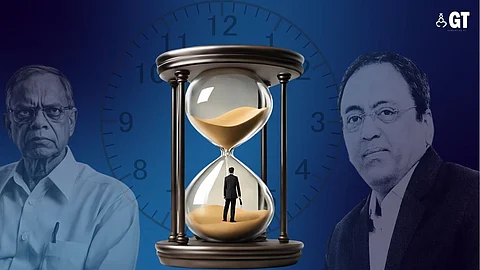

As swirls of capitalism sweep across the country, threatening to bear down the work-life balance, with its culture of excruciating working hours, there are sublime lessons to be learned from Goa’s way of life – popularly known as susegad, derived from the Portuguese word, Sossegado – meaning quiet, peace or contented.
What was, not so long ago, seemingly "compassionate capitalism" is lately threatening to morph into something draconian.
About a decade and a half back, we were still in the early days of capitalism.
On just another pleasantly warm and languid morning in Bengaluru, billionaire co-founder and chairman emeritus of Infosys NR Narayana Murthy, sat across the table in his office at the Electronic City, articulating his views on “compassionate capitalism” in a one-on-one interview.
Pan to a time late last year, and Murthy peeled off his mask of compassion to show a ruthless capitalist face, when he advised people to work up to 70 hours per week.
He drew a picture of capitalism – wrapped in compassion – where capitalists’ zeal for wealth creation did not override employees’ wellbeing.
Pan to a time late last year, and Murthy peeled off his mask of compassion to show a ruthless capitalist face, when he advised people to work up to 70 hours per week (11.66 hours per day for a six-day week and 14 hours for a five-day week) to drive India’s growth.
Soon after, Larsen and Toubro (L&T) chairman, SN Subrahmanyan, joined the chorus. He extended Murthy’s suggestion of weekly worktime of up to 70 hours to up to 90 hours (15 hours per day for a six-day week and 18 hours per day for a five-day week).
He too uncovered the hard-nosed face of capitalism, which has its foot in the door of the Indian economy.
Much before Murthy and Subrahmanyan, a senior executive of a global financial consultancy firm, shared his views on the subject.
In an informal chat, he applauded the various legislative amendments undertaken by the government, but acknowledged how revision in labour laws – whenever attempted – would be the toughest.
One of the reasons the capitalists cannot authoritatively argue for longer working hours in India is because of her huge human resource pool, which first needs to be skilled, and then, gainfully absorbed by the corporates and the public sector units (PSUs) before anyone can talk of longer work hours per week.
Again, linking longer worktime to economic growth does not stick in the Indian context.
If corporates desire to improve their revenue or production growth, they need to hire more people rather than overwork the existing ones (without giving them the statutory overtime payment).
If corporates desire to improve their revenue or production growth, they need to hire more people rather than overwork the existing ones (without giving them the statutory overtime payment).
In India, The Factories Act, 1948, and the Shops and Establishment Acts (SEA) mandate working hours of not more than 9 hours per day or 48 hours per week, including compulsory one-hour break every workday.
Even though each State sets its own working hours norms, their work hours schedules do not drastically differ from each other.
In case these standard working hours are breached, then the employers are liable to pay overtime to the employees. Normally, overtime payments are worked out at a rate of up to twice the standard wage.
Also, instead of harping on longer working hours for India’s growth, it would be more apt to focus on per capita productivity and per capita consumption.
Like other capitalists, Murthy also laments about free rations to a large proportion of our population; “800 million Indians receive free rations, meaning a significant portion of the population lives in poverty. If we are not ready to work hard, then who will?”
India’s high rate of poverty and her compulsion to distribute free rations to a large number of people is primarily due to lack of employment and lower wages even as the cost of living shoots up.
If one looks deeply into this subject, most Indians are ready to work hard if given the opportunity. The problem does not lie there.
India’s high rate of poverty and her compulsion to distribute free rations to a large number of people is primarily due to lack of employment and lower wages even as the cost of living shoots up.
Any suggestion of longer work hours beyond the legally permitted limit, without an equivalent salary increase, reeks of an exploitative mindset.
And, such mindsets should not be encouraged. With all our effective checks and balances in place, India should watch out not to slip into an exploitative labour or workforce system, like China’s.
Stretching work hours beyond what is permissible under the law could, in fact, be counter-productive as it could lead to physical and mental fatigue.
Subrahmanyan jeered at those wanting to take an off on Sundays, reportedly saying, “How long can you stare at your wife? How long can the wives stare at their husbands? Get to the office and start working.”
If the Murthys and the Subrahmanyans of the corporate world cannot fathom the beauty and benefits of downtime, they should be packed off to Goa for a lesson in susegad – an existence in which one is not trapped in the bubble of work (there’s so much more beyond it) and siestas (often stretching from 2 pm to 4 pm) are sacrosanct.